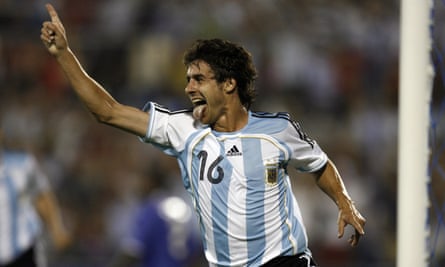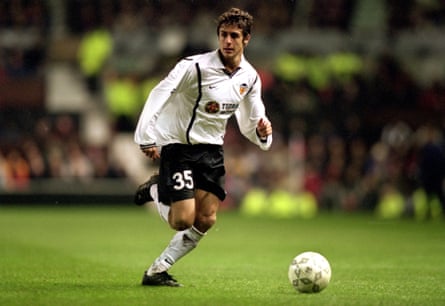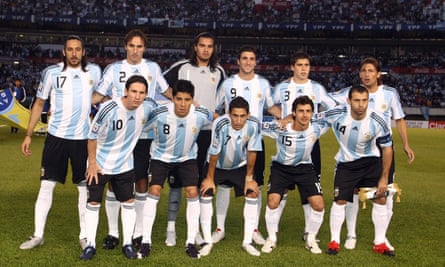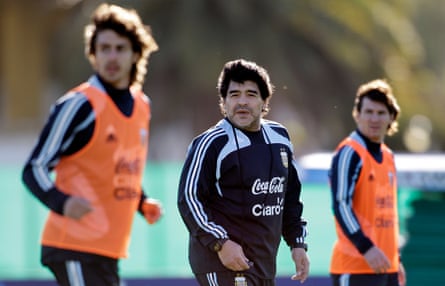Pablo Aimar: ‘We didn’t want to be Batman. We wanted to be Maradona’
You learn football by playing. There are good, intelligent coaches, with a lot of sense, who with just a few words can help you and give you advice that will be useful for the future. They do it by questioning you, too: “How do you sort this situation out? Doing what you normally do, or something else?” But young footballers can’t realise any of this without playing.
Today, I feel like I am where I want to be – coach of the Argentina Under 17s – and I’m enjoying it. Being a national age-group coach gives me the time top-division coaches don’t have. I like working with young players. I have heard that Argentina isn’t producing so many footballers any more. That might have been the case at some point, but that’s why working with youngsters appealed to me. If things hadn’t worked out with the national team, I’d be doing it somewhere else.
I accepted this challenge because the national team is heaven for working with youngsters. You can go and watch matches, choose the players, and you also have the AFA headquarters at your disposal. It’s perfect: 10 pitches that are like putting greens on two separate grounds. The job is to help young players develop a sense of belonging that makes them want to be full internationals. That’s something that is drummed into them from day one.

Pablo Aimar celebrates after scoring for Argentina at the Copa América in 2007.
Photograph: Rodrigo Arangua/AFP/Getty Images
We have very simple rules for peaceful co-existence that encourage respect for everyone who works here. We try to take a youngster down the path to becoming a footballer, and remind him that football gives you many things – but that the last thing you should aspire to is being famous. That is not always a positive.
It can be complicated because, in Argentina, if you play good football and you start to appear in the newspapers, you’re going to become well known. You’re going to be popular, famous. But if you have humble role models, you’re going to end up copying some good things.
On the pitch, we try to make sure our players don’t see the ball as a problem; they don’t have to get rid of it. We select players who perceive football in that way. Our belief is that this way of playing is going to help them to grow, to become better footballers who can play for big teams.
We want to play with bold centre-backs, for example, because we believe that it won’t be difficult for them to play in a team that operates with a more withdrawn shape. If we do it the opposite way round, it will then be difficult for them to adapt. If we tell them to get the ball away, play it long and look for the result, what happens if they end up playing for a coach who asks them to play in a more daring way? They won’t be able to do it. The other way around, they can do it. If, at the age of 25, a coach tells them to play long, it’s no problem. That’s the easiest thing to do.

Aimar playing for Valencia against Manchester United in the Champions League in 2001.
Photograph: Laurence, Griffiths/Allsport
I don’t know what would have happened if, as a young player myself, I’d have gone somewhere other than Valencia. I had come from River Plate, where we often had 70% of possession. At Valencia, we had much less of the ball. I enjoyed the team’s style of play, but I had to grow up, adapt and understand how we could compete – which we did for several years, even winning the league in 2002 and 2004. That was how we competed with the big clubs, so I learned to make the most of playing less with the ball.
I saw that the way we could compete with Real Madrid and Barcelona was by not conceding. It worked, and we ended up building a tough team that competed well with the big teams. I was only 21 years old when I arrived at Valencia, but I wanted to win. For Valencia, defending well was the path to victory. We had very good players, and we attacked little – but when we did, we did so quickly and decisively, finishing a lot of our plays.
I also learned that a coach could convince 20 players that this was the way they were going to compete. As a player, that is what you most want: to compete. So, if you have a coach who convinces 20 players of an idea, it becomes very difficult to beat that team. This is the difficult part of a coach’s job, though, and their task is titanic. You have to convince 20 players, but then only 11 can make it on to the pitch.
In the biggest leagues, tactical schemes are important. Even if you don’t realise it, they help you feel that you have something to lean on. For example, if the centre-back brings the ball out, they know which players will be available to receive it. This is a big help. That support gives you peace of mind; it helps you communicate with your teammates. Ultimately, that’s what being focused is all about – knowing what you have to do.
In age-group football, we design the system depending on the players we have: if we have two good wingers we want to give time on the pitch, then we find a way for both to play. We might have three centre-backs we want to play, so we let them build up pitch-time, let them add to their repertoire things like playing as a full-back. That’s how we see it – the system has a lot to do with the players we want to give time on the pitch.
All those principles have come through some of the coaches I played for. Marcelo Bielsa is someone who has an influence on others. He has left a great legacy to those who were coached by him, and that’s a tremendous attribute. I have a special admiration for him but, if I have to say just one thing about him, it must be the influence he has had on all those who know him and have been coached by him.
I didn’t think he was going to come to my farewell match, playing for my old club Estudiantes de Río Cuarto. When they told me he was there, I thought it was someone who looked very similar to him. It was just so incredible, but so typical of him. I didn’t get to see him afterwards, but it was something I was very proud of. In the end, these are the things you take with you.

The Argentina team in 2009. Back row: Jonás Gutiérrez, Rolando Schiavi, Sergio Romero, Gonzalo Higuaín, Nicolás Otamendi, Gabriel Heinze. Front row: Lionel Messi, Enzo Pérez, Ángel Di María, Pablo Aimar, Javier Mascherano.
Photograph: EPA
When I get together with former teammates, some of whom are very successful, no one talks about their track record. No one mentions it. We remember stories, particular moments, and these are the things that football leaves you with. Stories of friendship.
José Pékerman instilled in us that football was a game based on common sense and peace. I remember one day when José came before the Under-20 World Cup in Malaysia in 1997. He had won the tournament in 1995 and he reassured us. “Don’t worry,” he said. “We’re going to do well.” Today, several of us from that team get together and realise we played well in part thanks to José’s peace of mind. “Just play and create a nice memory,” he said. Everything was much less dramatic. Bielsa and Pékerman are human beings who have helped shape many people. This is why I say they are influencers.
Jorge Jesus is also someone I keep very much in mind. I use some of his reflections now that I’m coaching young players. For example, if they complain that the ball doesn’t come to them, I remind them of something he always said: “Great players are not anxious.” Obviously great players don’t hide, but nor do they get anxious. Those who can achieve that calmness make a huge difference; those who choose well when to move, when to go into a space, when to pass, when to play and not be anxious. All that has to do with patience.
I liked training with Jorge at Benfica. I liked the drills. I liked the explanations. I liked the passion with which he experienced football. I use a lot of things from him in my role as a coach. He would always tell us: “Whoever invented this drill invented it for a reason.” Footballers are rarely told why they are doing an exercise, but having it explained makes them do it well and go home happy. That’s why you play football – for the feeling you get both during and after.

Aimar, Maradona and Messi together in Argentina training in 2009.
Photograph: Natacha Pisarenko/AP
Football has a lot to do with chance, but then a player comes along who nullifies uncertainty, like Lionel Messi. We all believe that, when he plays, Barcelona are going to win. In the past 15 years, he has managed to exhaust all praise. He will play 60 or 70 matches a year and be the best player on the pitch more than 90% of the time. There is no need for any analysis. Anyone who has played at a certain level knows not to bother with discussion of how many metres he runs per game.
I am convinced that football is not about what, but when. The best footballers, beyond the fact that they do everything well, stand out because they know when to do things. Inevitably, I have to talk about Messi. He was probably more eye-catching at 22, when he could dribble past even his own shadow. Now, this latest version of him makes him the best of all; he does everything he has to, when he has to do it.
I’m not surprised by what Lionel Scaloni has done in his role as Argentina manager because he has always been passionate about football. What I admire most about him is the calm with which he has taken his place, how well he handles it, his communication and the rapport he has with the players. He is going to have a fantastic career.
What makes footballers believe in a coach or not? That will always be a mystery. Teams win with more or less technical players; with three defenders or five; pressing high, dropping low. Coaches who manage teams full of stars don’t get results, but then they go to another team with fewer big names and triumph. I have no answer as to what it is that makes players believe in you.
Sometimes, in football, you have a feeling – and the feeling in the two years that Scaloni has been in the Argentina job, along with Walter Samuel and Roberto Ayala, is positive. Diego Maradona gave us those same feelings. He was the greatest inspiration for those of us who were born in the 1970s and 1980s. At that time, there were already superheroes: Spiderman, Batman and others. But we didn’t want to be them. We didn’t want a Spiderman costume. We wanted to buy Maradona’s boots and his shirt. We wanted to be him.
We wanted to be Maradona, and we aspired to being the one who lifted the World Cup in Mexico in 1986. We wanted to be him at Italia ’90, insulting those who had insulted our anthem. That was Maradona, for all of us. And like him, we wanted one thing above all else: to learn by playing.
This article was published first by The Coaches’ Voice
Follow them on Facebook, Twitter, Instagram and YouTube
